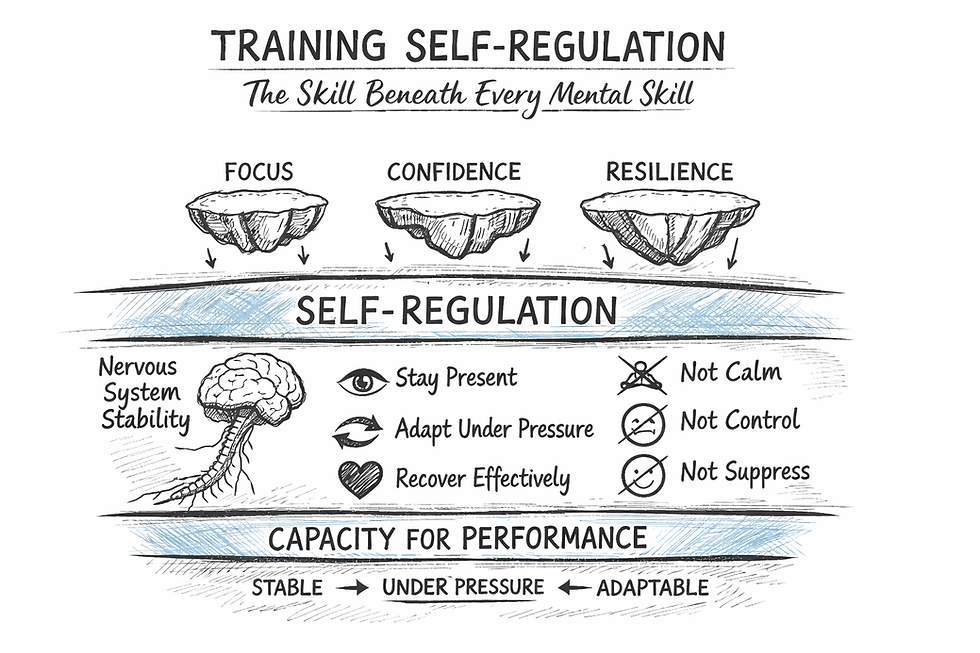How to Build Self-Trust as an Athlete: 5 Small Habits That Make a Big Difference
- Kate Allgood
- Jun 12, 2025
- 4 min read
Self-trust is your inner belief that you can rely on yourself — especially when pressure hits. For athletes, it’s the foundation that supports confidence, consistency, and composure in training and competition.
When you trust yourself, you're more likely to:
Take risks in high-pressure moments
Bounce back from mistakes or setbacks
Stay focused when distractions rise
Make bold moves without second-guessing
Perform with clarity instead of tension
But self-trust isn’t something you either have or don’t. It’s something you build — rep by rep, moment by moment.
How to Build Self-Trust: 5 Actionable Strategies for Athletes
These five practices help athletes train self-trust from the inside out — not by chance, but by choice.
1. Build It in Micro Moments
Self-trust doesn’t appear suddenly on race day. It’s built in the daily grind — during early mornings, tough drills, and recovery choices.
How to apply it:
Show up consistently, even on low-motivation days
Follow through on small commitments like mobility work or nutrition
Acknowledge small wins — these reps matter
Every time you keep a promise to yourself, you’re proving you can rely on you.
2. Set Boundaries to Protect Your Focus
Athletes often give too much of their energy away — to people, social media, or comparison. Setting clear boundaries protects your mental and physical performance.
How to apply it:
Say no to distractions that don’t support your goals
Set tech-free time before bed to improve recovery
Protect your pre-game routine like it’s part of your training plan
Boundaries build respect — and respecting your process builds trust.
3. Hold Yourself Accountable
Accountability isn’t punishment. It’s ownership. When you take full responsibility for your actions, progress, and mindset, you become someone you can count on.
How to apply it:
Reflect honestly: Did you give full effort today? Why or why not?
Keep a simple journal or log to track effort, focus, and consistency
Own mistakes without judgment — use them as feedback, not failure
When you hold yourself accountable, you learn to trust that you’ll do the work, even when no one is watching.
4. Practice Your Values (Don’t Just Talk About Them)
Values like discipline, grit, and integrity are more than motivational buzzwords. They're tools for decision-making under pressure.
How to apply it:
Define your top 1–2 values as an athlete
Ask daily: “How did I live this value today?”
Make decisions based on your values, not emotions
Living your values under stress helps align your actions with your identity — and that strengthens self-trust.
5. Choose Courage Over Comfort
Growth doesn’t happen inside your comfort zone. Neither does trust.
How to apply it:
Lean into discomfort in training — do the extra rep, the hard drill
Be willing to fail publicly and learn from it
Speak up about your needs with coaches or teammates
Every time you do something difficult with intention, your brain says: “We’ve got this.”
Final Thoughts: Self-Trust Is the Root of Consistency
Confidence can fluctuate. Motivation can fade. But self-trust is the steady ground underneath both.
Whether you're preparing for a championship, a race, or the next practice — trust is the thread that holds it all together. And it's not built in a day. It's built in the way you show up for yourself daily.
So ask yourself:
“What’s one small action I can take today to show myself I’m trustworthy?”
That’s how it starts.
Own your Attention. Unlock your potential.
Kate
About: Kate Allgood is educated in the field of applied sport psychology. She holds two Masters degrees in psychology where she graduated with distinction. After a very successful hockey career, she has spent the past 14 years working one on one with high school, college, Olympic, and professional athletes to help them with their mindset, mental performance and mental skills training. Kate has also been a consultant for professional teams, including the Anaheim Ducks primary minor league affiliate the San Diego Gulls, to help the team and players develop their mental game. It is important to note that while Kate has graduate school training in applied sport psychology and general psychology, she does not diagnose or treat clinical disorders, and is not a licensed psychologist.
**The information provided is not to dispense medical advice or prescribe the use of any technique, either directly or indirectly, as a form of treatment for physical, emotional, or medical problems, without the advice of a physician. The information provided is only to offer information of a general nature to help you in your quest for high performance. If you know or suspect you have a health problem, it is recommended you seek your physician's advice.
FAQs
Q: How do I build self-trust as an athlete? A: Self-trust is built by consistently showing up for yourself in small, everyday moments. Focus on micro habits, set boundaries, hold yourself accountable, live your values, and choose courage over comfort.
Q: Why is self-trust important for athletes? A: Athletes with high self-trust perform more consistently, recover faster from mistakes, and rely less on external validation. It’s a key part of mental resilience.
Q: Can self-trust be trained? A: Yes. Like any skill, self-trust is developed through intentional practice, consistent action, and honest reflection over time.



Comments